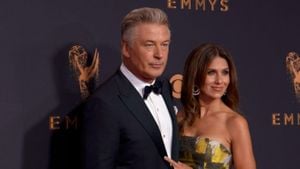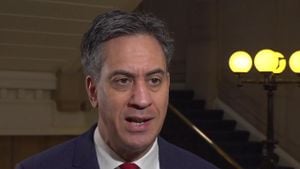BERLIN. The political landscapes have shifted dramatically following the recent Bundestag elections, where the Alternative für Deutschland (AfD) emerged triumphantly, doubling its votes and positioning itself as the second strongest party in Germany. This unprecedented rise has sparked reactions across various sectors, particularly the sporting world, where one of the loudest responses has come from Tino Chrupalla, the Chairman of the AfD.
Chrupalla, when addressing the press after the election results, expressed his gratitude for the congratulations he received, stating, "I want to thank the many congratulators" who reached out to him on the night of the election. Among those he mentioned are two former Bayern Munich players, whose names he did not disclose. This comment was wrapped in humor as he added, "So many greetings to Uli Hoeneß." This subtle jab at one of football's most respected figures reflects the growing tensions between the AfD and prominent public figures who oppose their far-right policies.
Uli Hoeneß, the honorary president of FC Bayern Munich, has not only been vocal about his disapproval of the AfD but has actively spoken out against the party, particularly just before the elections. He had warned, "If one of our players suddenly promoted the AfD, I would talk to him and ask if he still has all his cups together," indicating his concern over any involvement or endorsement of the party by players from the club he has represented for decades.
The tensions are not new; Hoeneß has regularly made headlines for his stance against the AfD, previously voicing his desires for football to reclaim national pride without the influence of far-right politics. At the memorial service for the German football legend Franz Beckenbauer, Hoeneß stated, "I wish to clearly state, I don’t want the AfD to be part of this process." His remarks resonate strongly with many football fans and oppose the AfD's perceived ideologies.
Chrupalla's remarks at the press conference have stirred quite the controversy. By implying the support of national players, he is not only teasing Hoeneß but also trying to undermine the criticisms directed at his party by individuals who were once seen as icons of German sports. His suggestion of backing from these players plays on the fears and divisions the AfD has instigated within society.
Reflecting on the political consequences of their electoral success, the AfD has seemingly felt emboldened. Co-chair Alice Weidel noted the party's determination to pursue its agenda, stating, "We will continue together," reducing the significance of Hoeneß’s and others' criticisms to mere noise against their rising tide.
FC Bayern’s current president, Herbert Hainer, has echoed Hoeneß’s concerns. He ensured fans and critics alike of the club's stance, making it clear there is no place for AfD members within the club structure. "No, I can’t envision having someone from the AfD on one of our committees," he asserted, emphasizing the party's extremist classification as per the Federal Office for the Protection of the Constitution, stating it "divides our society and tries to undermine our democracy."
Hoeneß's evident disdain for the AfD contrasts sharply with his outlook on cooperation and inclusivity within the football community. He stands as not only the face of Bayern Munich but as a representative of the values many supporters rally behind. His sustained efforts against racism and for integration through sports demonstrate his refusal to remain silent amid the rising political tide.
Commentators have noted how Hoeneß frequently tackles significant societal issues through the lens of football, intertwining the sport with morality and politics. He aims to guide players and fans toward embracing diversity, countering the nationalist narratives espoused by the AfD. With the Bundesrepublik having to deal with the outcomes of this recent election, many are left wondering what kind of political discourse will emerge.
At the same time, the challenge of the AfD now becomes more pronounced, as they would seek to leverage cultural icons like football players to gain legitimacy, the same way they have sought to embed themselves within broader political discussions. It will be fascinating to see how figures like Hoeneß and entities like FC Bayern will navigate this political minefield, especially as Germany moves toward the next national elections.
Overall, the AfD's newfound prominence poses pertinent questions for society at large. If the past reactions are any indication, the fight against the party’s ideology will continue to be central for numerous cultural and political influencers. Uli Hoeneß’s position remains significant, and his influence will likely play a pivotal role as Germany grapples with these ideological challenges.



